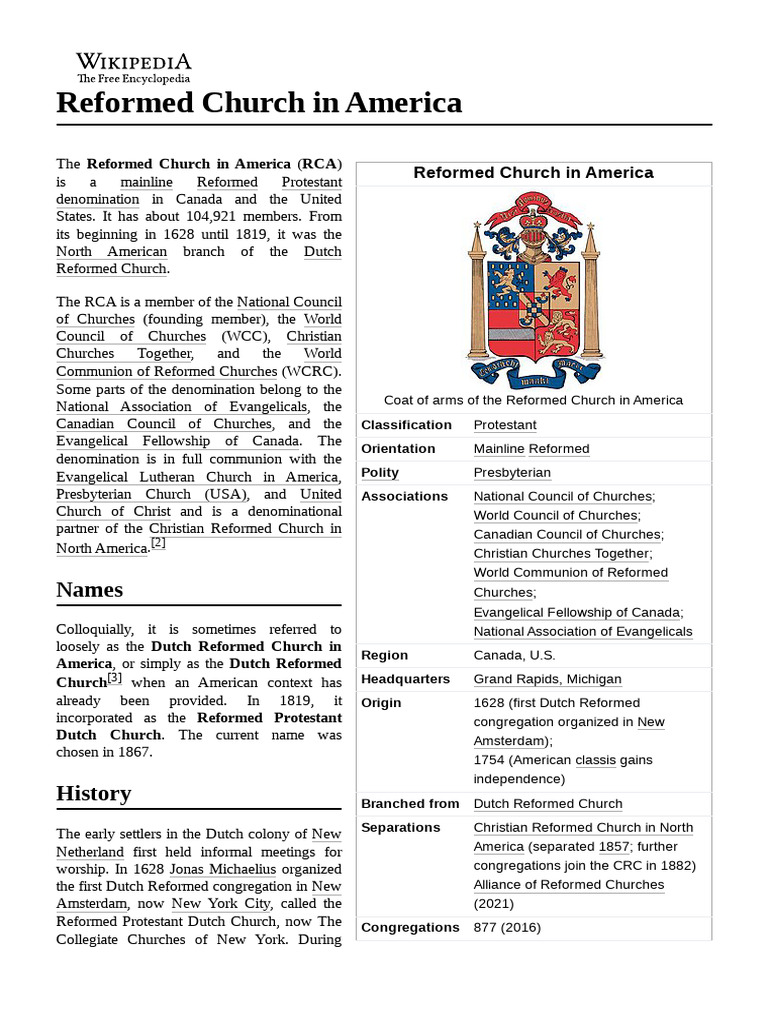The Reformed Church in America (RCA) embodies a rich historical tapestry woven from Dutch heritage and a steadfast commitment to Christian doctrine. Emerging from the Protestant Reformation, the church reflects a commitment to the core tenets of Calvinism. Before delving into its beliefs and practices, it is essential to understand its roots and the cultural context that shaped this denominational landscape.
Founded in the early 17th century, the RCA’s origins are deeply intertwined with the migration of Dutch settlers to America. As a branch of the larger Reformed tradition, the church found its early expression in New Amsterdam, present-day New York City. Initially, the congregations were administered by Dutch ministers who brought with them a nuanced understanding of scripture and a desire to cultivate an authentic Christian community within the New World. This historical backdrop is pivotal as it illustrates the interplay of faith and cultural identity among early American settlers.
The Dutch roots of the RCA manifest in its liturgical practices and ecclesiastical governance. The church is characterized by a Reformed approach to worship, which places a strong emphasis on preaching, sacraments, and the sovereignty of God. The centrality of scripture is a hallmark of the Reformed tradition, distinguishing it from other Christian denominations. Consequently, biblical exegesis plays a vital role in shaping the theological framework within which the RCA operates.
At its theological core, the RCA adheres to key principles derived from Calvinistic teachings: the authority of scripture, the necessity of grace through faith, and the priesthood of all believers. These tenets inform the church’s mission and outreach, emphasizing that salvation is not a product of human effort but a divine gift. The RCA seeks to foster an environment where believers can engage with scripture, allowing it to inform their lives and societal engagement.
One cannot overlook the RCA’s distinctive stance on social justice and community involvement, which stems from its interpretation of Christian doctrine. The church believes that faith must be actively lived out in the world. As such, congregations are often at the forefront of social reform initiatives, addressing issues such as poverty, racial inequality, and environmental stewardship. This commitment to justice is a vital expression of faith, reflecting the Reformed understanding of God’s kingdom manifesting on earth.
Worship within the RCA is marked by a blend of reverence and relevance. Liturgy tends to retain a traditional structure, featuring hymns, prayers, and sermons that speak to both the historical and contemporary experiences of believers. While there is a respect for established forms of worship, innovative expressions are also encouraged, enabling congregations to connect with diverse populations effectively. This dynamic facilitates a rich tapestry of worship experiences, accommodating various cultural backgrounds while remaining rooted in the overarching Calvinistic tradition.
The RCA also recognizes the importance of education and formation. Sunday schools, Bible studies, and catechism classes serve as platforms through which faith is nurtured. Far from being merely an intellectual exercise, this pursuit is viewed as integral to spiritual maturity. The church invests significantly in educating its members, ensuring that they are well-grounded in their faith while also being equipped to engage with the world around them meaningfully.
As a denomination, the RCA encompasses a variety of congregational expressions. From large, suburban churches to smaller, rural communities, the RCA represents a rich diversity within a shared theological framework. This variety offers a wide array of community and spiritual experiences for members. Each congregation often has its unique identity while remaining committed to the core beliefs of the Reformed tradition, fostering an environment where faith can flourish in multiple contexts.
The governance of the RCA is characterized by a cyclical system of church governance, where elders and deacons serve alongside pastors to guide congregational life. This collaborative approach highlights the Reformed understanding of the priesthood of all believers, affirming that every member of the church has a role to play in its mission. Through a blend of congregational input and synodical oversight, the RCA endeavors to maintain unity while allowing for local adaptation.
The RCA’s engagement with broader ecumenical discussions reflects its commitment to unity among Christians. Historically, the church has sought to bridge divides, participating in dialogues with other denominations and faith traditions. This ecumenical approach underscores a willingness to collaborate on common social issues, highlighting the belief in a shared mission to promote the values of the Christian faith.
In conclusion, the Reformed Church in America is a vibrant expression of Christian faith, rooted deeply in its Dutch origins and the principles of the Reformation. Its rich history, commitment to scripture, emphasis on education, and advocacy for social justice paint a complex yet cohesive portrait of a denomination that strives to embody the teachings of Christ in every aspect of life. As the RCA continues to navigate the modern landscape, it remains dedicated to fostering a community that embodies grace, truth, and love, deeply intertwined with the gospel’s transformative power.



